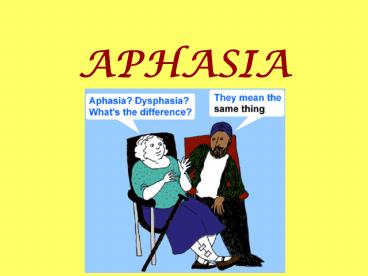APHASIA - PowerPoint PPT Presentation
Title:
APHASIA
Description:
APHASIA What is Aphasia? Aphasia is a total or partial loss of the ability to use words. Causes The left hemisphere of the brain has been compromised. – PowerPoint PPT presentation
Number of Views:270
Avg rating:3.0/5.0
Title: APHASIA
1
APHASIA
2
What is Aphasia?
- Aphasia is a total or partial loss of the ability
to use words.
3
Causes
- The left hemisphere of the brain has been
compromised. - Stroke, tumors, trauma, infection (ex herpes)
however, does not include conditions attributed
to a loss of muscle control.
- Since aphasia is a condition caused by other
factors, its usually diagnosed quickly via
language assessments. - -Boston Diagnostic Aphasia Examination or the
Western Aphasia Battery
4
Lets Take A Closer Look
5
Types Of Aphasia
- Global
- Wernickes
- Brocas
- Conduction
- Transcortical Motor
- Transcortical Sensory
- Anomic
6
Global- An almost total reduction of all spoken
and written language. Involves severe Brocas and
Wernickes aphasias.
- Wernickes- Speech is preserved, but language
content is not correct. This may vary from a few
incorrect or nonexistent words to a profuse
outpouring of jargon. - Ex I called my mother on the television and did
not understand the door. It was too breakfast,
but they came from far to near. My mother is not
too old for me to be young.
Brocas- These individuals frequently speak
short, meaningful phrases that are produced with
great effort. They tend to leave out words such
as and, the, is Ex Individuals may say,
"Walk dog" meaning, "I will take the dog for a
walk".
7
Conduction- Seen in individuals with damage to
the arcuate fasciculus, the structure that
transmits information between Wernicke's area and
Broca's area. Auditory comprehension is almost
normal, and oral expression is fluent with
occasional minor errors. The ability of
repetition is quite poor.
Transcortical Sensory- Similar to Wernickes
aphasia, but repetition ability remains unharmed.
Transcortical Motor- Similar to Brocas aphasia,
but repetition remains intact for simple
conversations. The ability is lost with more
complex conversations. This is associated with
right hemiparesis, meaning that there will be
paralysis of the patient's right arm, leg, and
face.
Anomic- Refers to a difficulty with naming. The
patient may have difficulties naming certain
words, linked by their grammatical type (e.g.
difficulty naming verbs and not nouns) or by
their semantic category (e.g. difficulty naming
words relating to photography, but nothing else)
or a more general naming difficulty.
8
Symptoms
Excessive creation and use of personal neologisms
(accepted-slang) Agrammatism (inability to speak
in a grammatically correct fashion) Inability to
pronounce, not due to muscle paralysis or
weakness Dysprosody (alterations in inflexion,
stress, and rhythm) Paraphasia (substituting
letters, syllables or words) Poor enunciation
(not clearly spoken) Inability to comprehend
language Inability to speak spontaneously
Persistent repetition of phrases Inability to
repeat a phrase Inability to name objects
Incompleted sentences Inability to form words
Inability to write Inability to read
9
Treatment
- In some instances, an individual will completely
recover from aphasia without treatment. This type
of "spontaneous recovery" usually occurs
following a stroke.Recovery usually continues
over a 2-year period.Speech-language therapy - start early
- build on success
- shift focus
- outings
- Group therapyFamily involvement
10
(No Transcript)

























![[PDF] Speech Therapy Aphasia Rehabilitation *STAR* Workbook IV: Activities of Daily Living for: Attention, Cognition, Memory and Problem Solving Paperback – December 30, 2014 Ipad PowerPoint PPT Presentation](https://s3.amazonaws.com/images.powershow.com/10100111.th0.jpg?_=20240816056)





